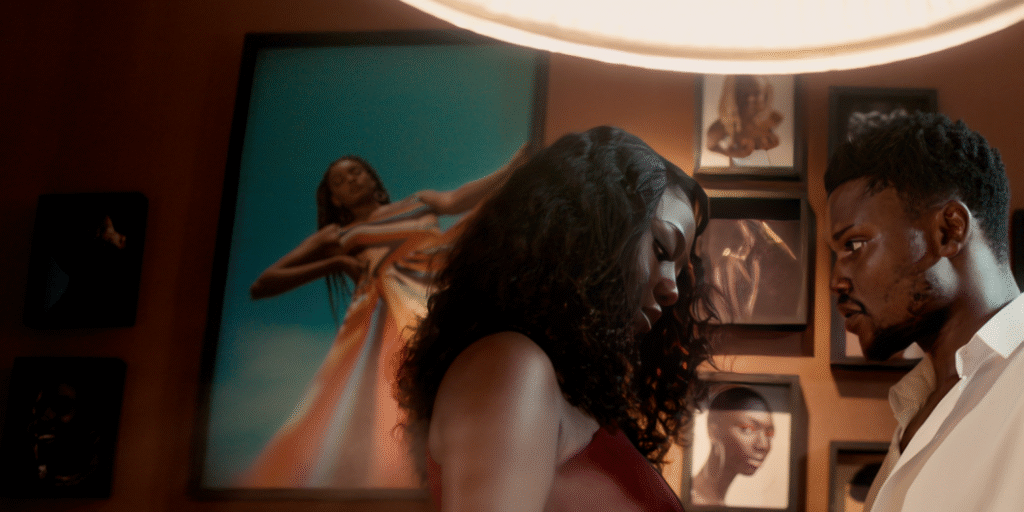Owambe Thieves, produced by Eniola Ajao and directed by Adeola Oni, follows a struggling couple who, fed up with their reality, decide to hustle their way out of poverty by crashing into the world of rich Yoruba parties, not as guests, but as thieves.
Plot
The movie kicks off with Cheta, a factory worker, husband, and new father who gets unjustly fired from his job. He’s hot-tempered, rough around the edges, and not exactly the easiest man to live with. Despite landing another job as a site supervisor, his anger gets the best of him again, and he loses that one too. Worse still, the factory was paying for his staff housing, so once the job is gone, the home is gone too.
With nowhere to go, Cheta and his wife, Lola, move in with a “friend”, one who ends up being a snake in the grass. This so-called friend begins making advances toward Lola. She stays quiet at first, but when he tries to assault her, Cheta steps in. A fight breaks out, and they’re thrown out again, now with a baby and no home.
Lola’s mother, a sharp-tongued woman with a booming fashion business, is no fan of Cheta. She’s never forgiven her daughter for marrying “a poor Igbo man,” and she makes that known. But despite the tension, they move back into her home just in time for Lola’s sister, Tade’s wedding introduction. Tade is marrying a wealthy senator as his fifth wife. As expected, the family praises this new union while openly mocking Lola and Cheta.
But something changes that day. At the party, with money flying left and right during the spraying session, Lola gets an idea: “pick and move out.” That’s their new hustle: crashing lavish Owambe parties to steal money. It sounds ridiculous, but it works. One heist in, and their lives turn around. They buy a house, get a car, and start living well.
Meanwhile, Chade’s marriage crumbles. She gets caught cheating on her senator-husband with a young staff boy. She’s thrown out of the house, disgraced and ironically, the only ones willing to take her back in are Lola and Cheta, the same people she once looked down on.
But just as things start to look good, cracks begin to show. Cheta starts cheating on Lola, and their relationship begins to fall apart. Still, there’s one last big job they want to pull off. This time, they’re targeting the son of Cheta’s former factory boss. They even bring a gun, ready for whatever may come.
But hell hath no fury like a woman betrayed. Just as they’re being chased by the police, Lola turns the gun, not on the cops, but on Cheta, ready to deal with the real thief in her life: her husband. The movie ends right there, leaving us with a cliffhanger and a promise of more chaos to come.
Cast
The casting for Owambe Thieves did very little to salvage an already weak script. If anything, it made the entire movie feel more like an extended joke than a serious production. Despite the film being produced by Eniola Ajao, who also played the lead role of Lola, it felt like she was the only one who actually showed up to work. Her performance carried a certain level of commitment and presence, but unfortunately, she was surrounded by a cast that mostly treated the project like a casual skit.
Casting Zubby Michael as Cheta was a major misstep. His portrayal lacked depth, discipline, or even comedic timing. His unseriousness bled through every scene, making it hard to connect with his character. Rather than coming across as a desperate, frustrated man pushed to the edge, he looked like someone fully aware he was acting and not in a good way.

The movie also suffered from the unnecessary injection of “popular” faces, not necessarily talented ones. The appearances of Papaya Ex, Phyna, Denrele Edun and even Odunlade Adekola felt forced and, at times, distracting. It came off like a checklist of influencers rather than a thoughtful cast list. Femi Branch and others brought some presence, but it wasn’t enough to mask the film’s lack of cohesion.
The one exception might be Sola Sobowale. She brought her usual gravitas, and while her role wasn’t enough to change the direction of the film, she gave it a touch of professionalism that briefly lifted the overall performance quality. Still, she felt misplaced in a film that didn’t seem to know what it wanted to be.
In all, the casting lacked intention and chemistry. It leaned heavily on star power, but that star power wasn’t harnessed in any meaningful way. The overall execution was weak. The casting felt random, the dialogue lacked rhythm, and the story couldn’t carry its own weight. In the end, Owambe Thieves came off as more of a joke than an actual film, an unfortunate miss on nearly every front.
Language
The language of Owambe Thieves was a blend of English, Pidgin, Yoruba, and Igbo, a mix that could have worked well to reflect Nigeria’s diversity, if only the rest of the film matched up.
Final take
Visually, the movie had promise: the picture quality was sharp, the colours were vibrant, and the setting felt rich and appropriate for the story it was trying to tell. But that’s where the praise ends.
One of the film’s most jarring issues was the sound. There was an odd imbalance between the audio and the visuals; the sound design felt out of place and often clashed with the mood of the scenes. It made the movie harder to enjoy and stripped even the most dramatic or comedic moments of impact.
As for the plot, it simply didn’t hold up. It felt lazy and underdeveloped, a storyline that lacked both direction and originality. Nothing about it was compelling enough to justify a cinema ticket. From start to finish, it felt like a rushed, unserious attempt at storytelling.


















